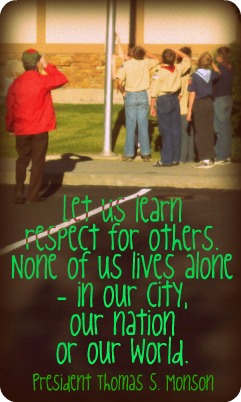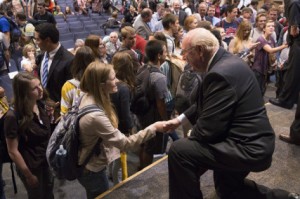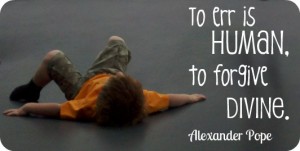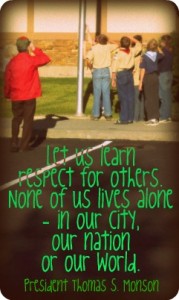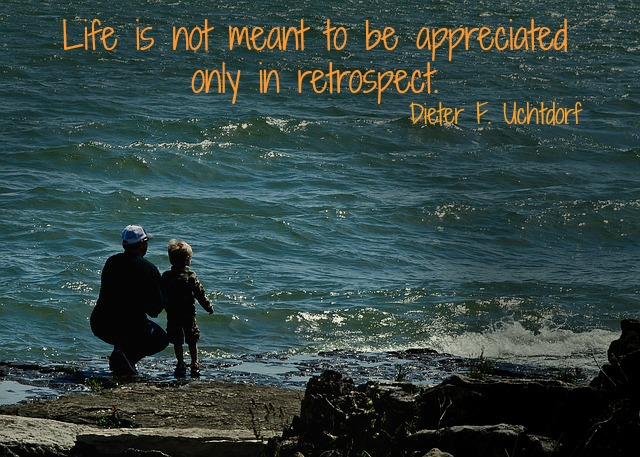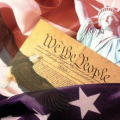The musical “Oklahoma” has a great song called “The Farmer and the Cowman Should be Friends.” It goes something like, “Oh, the farmer and the cowman should be friends. One man likes to pull a plow, the other likes to chase a cow. But there’s no reason why they can’t be friends…” Leaders of The Church of Jesus Christ of Latter-day Saints (sometimes inadvertently called the Mormon Church) and Evangelical leaders are singing a similar tune—we may have doctrinal differences, but there’s no reason why we can’t be friends. As religious liberty (the freedom to think, believe and act according to one’s deeply help beliefs) is increasingly under attack in America, these friendships are all the more crucial. Just as “territory folks should stick together,” religious folks should stick together—and fight for religious freedom. R. Albert Mohler, president of the Southern Baptist Theological Seminary in Louisville, Ky., said in his speech at Brigham Young University (The Church of Jesus Christ’s flagship school):
… Only those with the deepest beliefs and even the deepest differences can help each other against the encroaching threat to religious liberty, marriage and the family. [1]
Mormons and Evangelicals Can Be Friends
Nearly a decade ago, two evangelical leaders made interfaith headlines when they spoke in the home of the Mormon Tabernacle Choir. It was the first time since 1899 that an internationally renowned evangelical spoke at the Tabernacle on Temple Square in Salt Lake City. Richard Mouw, then-president of the Fuller Theological Seminary, gave a 7-minute introduction for renowned Christian philosopher Ravi Zacharias on that historic occasion. [2] Some have called this the beginning of friendly relations between the Latter-day Saints and the evangelicals that continues today. In September, two members of the Quorum of the Twelve Apostles (with the First Presidency, the governing body of The Church of Jesus Christ) traveled to Washington, D.C., to attend the inauguration of Dr. Russell Moore as the head of the Southern Baptist Convention’s Ethics and Religious Liberty Commission. Mohler spoke at Brigham Young University in October. Other evangelical leaders—including Mouw and Zacharias—are also scheduled to speak (or have spoken) in Utah. Mouw, who retired in June but has been a longtime proponent of evangelical-Mormon dialogue, said:
At the very least, the two communities, evangelicals and Mormons, have been … each other’s worst enemies. There’s a significant part of the evangelical movement that is now having healthy and friendly conversations, and it’s gone from a group of two dozen scholars talking to each other to church leaders meeting each other, going to see each other. [3]
Christian Forgiveness
Latter-day Saints and evangelicals have their differences. Mouw, in his 2004 speech at the Tabernacle, apologized to members of The Church of Jesus Christ, saying, “Let me state it clearly. We evangelicals have sinned against you.” [4] He continued, “We’ve often seriously misrepresented the beliefs and practices of members of the LDS faith. It’s a terrible thing to bear false witness.” [5]
Unfortunately, misunderstanding and misconceptions about another’s beliefs often lead to dissemination of misinformation—in other words, bearing false witness. Mormonfaq.com is a website that answers questions about The Church of Jesus Christ and its beliefs—although it is not affiliated with the Church nor an official Church website. Another website—made to look exactly like mormonfaq.com—compares the teachings of The Church of Jesus Christ to another religion. The result is misinformation, misrepresentation and confusion. It is truly bearing false witness against another. If I had an abscessed tooth, I wouldn’t ask a podiatrist for help. Likewise, as a Latter-day Saint, I am wholly unqualified to answer questions about the Jewish religion. The same is true if someone of another faith tries to explain the teachings of The Church of Jesus Christ. It just doesn’t work very well—and it can cause divisiveness among religious communities. As John Taylor, the director of Interfaith relations for The Church of Jesus Christ, said:
There’s a realization among faith groups generally that despite doctrinal differences — and we have doctrinal differences, there’s no question about that — we do have areas of commonality. [3]
And we need to build upon our commonalities to fight for our common causes.
Building on Our Common Ground
Finding commonalities in Christianity shouldn’t be too difficult—we all believe in Jesus Christ and His teachings. When asked what the most important commandment was, the Savior replied: Love the Lord thy God will all thy heart, and love thy neighbor as thyself. But our commonalities extend further. Christians believe in the Savior’s Atonement, and we celebrate His birth at Christmas. We honor His Death and celebrate His Resurrection at Easter. There are definite and distinct doctrinal differences. But focusing on these will never build bridges between religions—it will only tear them down.
Christians can also find common ground with Muslims, Hindus, Jews and other religions. We all believe in a higher power and doing what’s right. The words of Elder M. Russell Ballard, an Apostle of Jesus Christ, to an LDS audience ring true for people of all faiths:
For the most part, our neighbors not of our faith are good, honorable people—every bit as good and honorable as we strive to be. They care about their families, just like we do. They want to make the world a better place, just like we do. They are kind and loving and generous and faithful, just like we seek to be. [6]
These are similarities that we all can and should embrace.
Cultivating ‘Convicted Civility’
Mouw advocates convictions and civility—or “convicted civility.” He wrote:
When I decided to explore the subject of civility two decades ago, I was especially concerned about the ways in which religious convictions seemed to be at the root of much of the mean-spiritedness in the world. … In recently revising my book, I still had to deal with the fact that religion continues to be a big part of the problem. Christian denominations are torn apart by angry debates over sexuality. Both sides in the ongoing culture wars engage in sloganeering. Religious extremists, on the left and the right, propagate their own conspiracy theories about their religious and irreligious enemies.
As the Lutheran scholar Martin Marty once observed, people these days who are civil often lack strong convictions, and people with strong religious convictions often are not very civil. What we need is convicted civility. [7]
Elder Robert D. Hales, an Apostle of Jesus Christ, echoed this sentiment. He said:
To … all who seek to know how we should respond to our accusers, I reply, we love them. Whatever their race, creed, religion, or political persuasion, if we follow Christ and show forth His courage, we must love them. We do not feel we are better than they are. Rather, we desire with our love to show them a better way—the way of Jesus Christ. [8]
If followers of Jesus Christ—no matter which Christian church they belong to—adhered to His teachings of love and compassion for each other, we would accomplish much more good in the world. However, followers of Jesus Christ also feel obligated to teach correct doctrines and principles to others. And sometimes these principles and doctrines differ between religions. But we can all listen to each other and agree to disagree—with convicted civility.
Mouw gave an excellent example of cultivating this civility. He had given an address on this subject at a university, and one professor talked about an exchange his religious group had with a gay-lesbian group on campus. The religious group had run an ad in the newspaper explaining why same-sex relations were against the laws of God. The gay-lesbian group responded with an ad, and the exchange became acrimonious. The evangelical asked, “What could we have done differently?” Mouw responded:
At the very least, I said, his folks might have talked with the gay-lesbian leadership privately before going public with their views. “You could have sent them a copy of the ad you planned to run, and asked them whether there was anything in it that they found abusive. And you could have invited them to have lunch with you to talk about the topic before going public with your views.”
His response, expressed in a genuinely regretful tone: “I wish we would have done that!”
A month later he wrote me a letter. “After you and I talked,” he said, “we contacted the gay-lesbian leaders. We told them that we are very sorry we had not met with them privately before publishing our ad. And we asked them if we could meet over lunch, and they accepted.”
The encounter had started out badly, he reported. The [other group was] very angry. But at one point one of them told about some terrible experiences she had as a teenager in an evangelical church. “We were very moved by her story,” he said, “and we told her so.” Some tears were shed on both sides. “We agreed not only to disagree, but to keep meeting on a regular basis. It was a tough conversation, but we evangelicals were so glad we reached out. It sure beats angry public name-calling.” [7]
We don’t have to agree—we just need to agree to disagree with civility. And this begins with private, respectful, one-on-one conversations. Peaceful, civil discourse in the public square are more likely to occur when both sides see each other not as faceless adversaries but as real people trying to do what they feel is right. Elder Quentin L. Cook, an Apostle of Jesus Christ, offered this counsel for followers of Christ:
…How we disagree is a real measure of who we are and whether we truly follow the Savior. It is appropriate to disagree, but it is not appropriate to be disagreeable. Violence and vandalism are not the answer to our disagreements. If we show love and respect even in adverse circumstances, we become more like Christ. [9]
With Religious Freedom, ‘We Hang Together or We Hang Separately’
Religious liberty is an important issue in today’s world because it is competing with other, more popular issues—and seems to be losing ground. Mohler explained:
When you have competing liberties, society is always going to have to make a choice on which liberty is greater than the other. In the history of the United States, the greatest tension on this has been on individual liberty against the demands of a larger democratic process. What we have (today) is what I identify as “erotic liberty” against “religious liberty.” … What’s being claimed is, someone’s freedom to be themselves requires your accommodation to their sexual orientation and lifestyle. So you look at some of the bigger issues, and what can be called erotic liberty is at the very essence of so many of the most controversial cultural movements of the last half century … issues of gender, sexuality, reproduction, you go down the list.
The question is, how will society adjudicate and work out a way of deciding which liberty is going to have to give way? … For instance, on the question of the contraception mandate (in the Affordable Care Act), the argument being made by the Obama Administration is the reproductive liberty of women trumps the liberty of Christian institutions to refuse to participate in either the funding or distribution of contraception or of … possible abortifacients. The same issue would be true on same-sex marriage where the same claim of liberty can be used to say, “My sexual orientation liberty trumps the ability to say you will only place babies from your Catholic adoption agency in homes headed by a heterosexual couple.” … The collision of liberties isn’t new; you can read about them in the federalist papers. But this is a new form. [10]
Richard Land, president of the Southern Evangelical Seminary, also spoke at BYU this fall. He said in a Deseret News interview, “When it comes to religious freedom, we all hang together or we all hang separately. We are common targets in this.” [1]
During his speech at BYU, Mohler said, “I do not believe that we are going to heaven together, but I do believe we may go to jail together.” Afterward, he explained:
I wasn’t exaggerating, I was speaking honestly when I said we may go to jail together. I don’t necessarily mean going to prison together, but I think we’re going to suffer the coercive power of the secular state together. [1]
Land said, “Those who oppose us are not going to make any distinctions. They’re hostile to people of faith, period.” [1]
People of faith need not make any distinctions, either. They can show the same love for all people in the public square. As we follow the example of Jesus Christ in all things—especially in the way we treat each other—we draw closer to our Savior and set an example worthy of being followed.
Believers Must Band Together
The Savior taught, “Every kingdom divided against itself is brought to desolation; and every city or house divided against itself shall not stand” (Matthew 12:25). Believers must band together to fight for their religious liberties. Divided, they cannot withstand their foes. But united, they will be heard. Cardinal Francis George—who spoke at BYU in 2010—said:
The lesson of American history is that churches and other religious bodies prosper in a nation and a social order that respects religious freedom and recognizes that civil government should never stand between the consciences and the religious practices of its citizens and Almighty God. …
Sometimes our common advocacy will make one of us the target of retribution by intolerant elements. … [But] in the coming years, interreligious coalitions formed to defend the rights of conscience for individuals and religious institutions could become a vital bulwark against the tide of forces that work in our government and society to reduce religion to a purely private reality.
I’m personally grateful that after 180 years of living mostly apart from one another, Catholics and Latter-day Saints have begun to see one another as trustworthy partners in the defense of shared moral principles and in the promotion of the common good of our beloved country. Our churches have different histories and systems of belief and practice, although we acknowledge a common reference point in the person and the gospel of Jesus Christ. [11]
Mohler said in his BYU address:
Your faith has held high the importance of marriage and family. Your theology requires such an affirmation and it is lovingly lived out by millions of Mormon families. We stand together for the natural family, for natural marriage, for the integrity of sexuality within marriage alone, and for the hope of human flourishing.
I come in the hope of much further conversation, conversations about urgencies both temporal and eternal. I am unashamed to stand with you in the defense of marriage and family and the defense of human sexual integrity. I am urgently ready to speak and act in your defense, against threats to your religious liberty, even as you have shown equal willingness to speak and act in defense of mine. [1]
Elder Dallin H. Oaks, an Apostle of Jesus Christ, said:
Believers can and must seek laws that will preserve religious freedom. …The United States and other nations are experiencing a disturbing reduction in overall public esteem for religion. Once an accepted part of American life, religion is now suspect in the minds of many. Some influential voices even question the extent to which our constitutions should protect the free exercise of religion, including the right to practice and preach religious principles.
This is a vital matter on which we who believe in a Supreme Being who has established absolute right and wrong in human behavior must unite to insist on our time-honored rights to exercise our religion, to vote our consciences on public issues, and to participate in elections and debates in the public square and the halls of justice. We must stand shoulder to shoulder with other believers to preserve and strengthen the freedom to advocate and practice our religious beliefs, whatever they are. For this purpose we must walk together on the same path in order to secure our freedom to pursue our separate ways when that is necessary according to our separate beliefs. [12]
Believers must stand together to defend their religious liberties. Latter-day Saints, Catholics, Evangelicals and those of all other religions must stand shoulder to shoulder on these matters. Otherwise, our deeply held beliefs will be relegated to the privacy of our own homes. And this is not true freedom. True freedom is the ability to not only think and believe but to act according to our deeply held beliefs. Our actions speak louder than our words. And if we only live our religion in the privacy of our own homes, then we don’t really live our religion. We must be able to live our religion wherever we are. We must respect the rights of others, but we must stand up for our rights as well.

